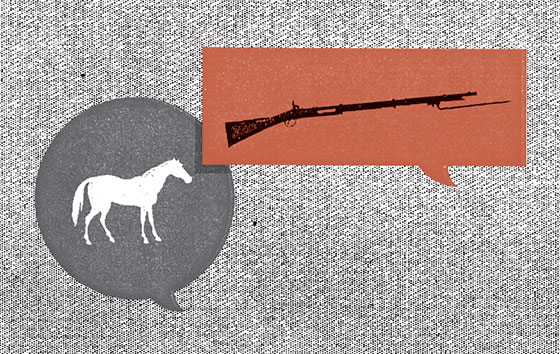
Barack Obama has been called “the first meme president” and certainly this has been a meme-filled election. But for all the analysis of whether reducing campaign events to viral online humor is good or bad for democracy (consensus: bad), less has been said about what politics is doing to a once-uncorrupted comedic device. Scott Brown, New York Magazine theater critic and occasional composer of funny songs, takes up that question with Daily Intel’s Dan Amira, Vulture’s Amanda Dobbins, and the Cut’s Maureen O’Connor.
Scott Brown: When Obama uttered his “horses and bayonets” zinger in the third debate, we all previsualized the blizzard of memes it would set off—it felt that rote. Have presidential sloganeering and campaign gaffes fatally infected the great American free-range meme? Is any of this crap even funny anymore?
Amanda Dobbins: Sure, memes can still be funny. Within minutes of the “horses and bayonets” comment, I saw multiple jokes about a “horse_ebayonets” Twitter account, and I chuckled … though those were admittedly meta-jokes about the Internet’s collective inclination to turn every debate quip into a parody account. Maybe it’s just the way we meme now—the one-note, who-can-get-there-first comedy—that’s become exhausting.
Dan Amira: The genuinely funny memes are getting increasingly difficult to find beneath the avalanche of slapdash, low-quality efforts. Most of the Tumblrs and parody Twitter accounts that appeared instantaneously on debate night don’t offer anything approaching a clever, consistent take. A running list of photos, GIFs, and videos somehow relating to horses and/or bayonets is not exactly comedy gold.
A.D.: I’d also argue that our standards are higher in this election. Remember the remix of Howard Dean yelping in Iowa? Kind of unwatchable now, but it was all we had in 2004. Now we know that it’s possible, even easy, to Auto-Tune Obama’s speeches so that he’s singing “Call Me Maybe,” and we expect more sophistication from what has always been a pretty basic comedy formula.
S.B.: It’s gotten to where we actually depend on memes epistemologically. And I’d say we overdepend on the comedy-plebiscite to tell us whose ideas are winning. It’s basically just insta-polling at this point.
Maureen O’Connor: I wonder if the efficiency is what irritates us. Between the first debate and last one, even, I think the insta-meme-ing sped up.
A.D.: A meme is not actually a meme without that shared sense of success—that a community of people kept flogging a joke until it ended up on the Today show or whatever. If a meme skips that middle step, there’s no sense of ownership.
D.A.: The presidential campaigns have spent an inordinate amount of time trying to make memes “happen” or to keep them alive once they do. Nearly a full week after Romney’s “binders full of women” remark, John Kerry told CNN that he was chosen as President Obama’s debate partner out of “binders full of senators.” But the Internet isn’t to blame. Memes continue to serve a purpose.
M.O.: Agreed. Though I will probably punch at least one “binders full of women”–costumed individual in the face this Halloween, my rage is from the repeat exposure, not because I actually think memes damage anything. If it takes a barrage of jokes to make people Google “sequestration” to see what it means (not saying I did that, but for the record, the Internet could use some better explainers on that topic), overall, that’s a good thing.
Have good intel? Send tips to intel@nymag.com.